“Now, when we are attempting to get closer to EU, we want to critically and calmly embrace that which is good in Western Europe,” His Beatitude Lubomyr
Tuesday, 05 November 2013, 14:52 The service of His Beatitude Lubomyr (Husar) as a hierarch to his Church and to his people distinguishes itself by the spiritual insight and a mature and premeditated Christian position in various aspects of spiritual and social life of Ukraine.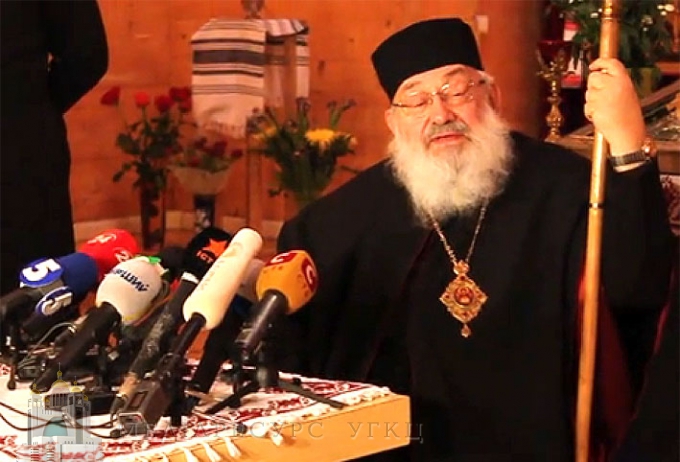
-
See also:
- Europe suffers from fatigue. We ought to return to vision of its founders, - Pope Francis to participants of CCEE jubilee
- The Head of the UGCC: Europe has probably retreated from the fundamental principles of unity and solidarity, but I am sure that this will change
- ‘A PEACEFUL AND CONFIDENT VOICE’
As a decade ago, so also today, the charismatic figure of His Beatitude Lubomyr distinguishes himself by the high moral authority, generally acknowledged both in Ukraine and beyond it. He stands out among other religious leaders by his active search of a spiritual balance of a Christian and a citizen in a changing society, almost ironically, as the imperturbability of a wise monk to the trivialities of this world and, in particular, by the especially comprehensible and simple language when talking about holy and complicated issues.
Leaving the position of the Head of UGCC has in no way diminished his active presence among the people. He still stands in the thicket of events: numerous meetings, initiatives, scholarly conferences (for example, a recent one in Ivano-Frankovsk was covered by us).
Today we offer the readers of Halychyna an interview with His Beatitude Lubomyr.
Your Beatitude, during the scholarly conference in memory of Josyf Slipyi, it was particularly pleasant to observe the tie of generations and the live tradition of the Church: how you reminisced about Josyf Slipyi as your spiritual father and predecessor, and Bishop Volodymyr, in his turn, mentioned you…
That is totally natural. It is as in a large family where there present are a grandfather, a father, a son, grandchildren. In a certain way the Church reminds us of this natural wheel of life, in which the spiritual qualities and the way of action of the elder priests are taken over by the younger generation. And so it goes on from generation to generation… You see, even though we often talk about the misunderstandings between generations – and that happens due to many things – but in every family there is a transmission of views on crucial issues and ways of resolving them. And so it should be. And this continuum, when one generation passes on to the next one significant information and certain possessions, creates a spiritual tradition. So it is in the Church.
When you were in the Studite monastery, you -- as one of the closest associates and a trusted person of His Beatitude Josyf (Slipyi) -- were placed a heavy cross by him on your shoulders. Did you have any doubts when the Patriarch chose you as his successor in pectores?
You see, there is a very simple thing. When I entered the Studite monastery and became part of the monastic family, the Grotta-Ferrati monastery near Rome had already existed long before my arrival there. I only attempted to take an active part in those tasks which he delegated to me. And although the event that you mentioned took part within the walls of the monastery it occurred due to circumstances independent of the monastery or a monastic life. The appropriate moment arrived – it was in 1977 – when His Beatitude Josyf invited me to take on this responsibility. He explained why. The issue was very simple. In Ukraine the Church was persecuted and the organs of Soviet security tracked and knew everything -- who and how. And His Beatitude, who was in very close contact with Ukraine, in as much as the circumstances permitted, understood well and knew the situation from the inside, and wanted to protect the Church from potential danger.
There existed a real threat that KGB, aware of the hierarchy underground, could one simple day simply get rid of all of our bishops. Then it would become a crisis for our whole Church. In order to protect the Church from that, His Beatitude Josyf invited the three of us: rev. Ivan Khoma, rev. Stepan Chmil, and me – and said that our task would be nothing else but only to be prepared for such a development of events. Not to undertake any specific office or something similar, but simply to be prepared for extraordinary developments. Should all the bishops in Ukraine be executed, then we should be responsible for assuring that that apostolic tradition of bishops not be broken. According to the late Beatitude, we should not even remain there. Because, in his opinion, even though we were Ukrainian and all born in Ukraine, we did not know well bolshevik realities and our longer presence in Ukraine would in no way help the faithful. We were only required to ordain certain priests as bishops -- those who possessed the qualifications and knew well the situation in the Catacomb Church and would know how act and to deal with the faithful in these circumstances.
Next year, the Church will commemorate the 25th anniversary of emerging from the catacombs, although the first declaration of coming out of the catacombs was issued already on August 4, l987. In this short time UGCC lived through a tumultuous reincarnation: it is enough to simply survey the newly-formed metropolitanates with their active offices – from youth organization to the charitable assistance organizations such as Caritas and the Maltese Service of Assistance, from the emergence of exemplary Christian schools and lyceums to the expansion of metropolitanate seminaries and the Ukrainian Catholic University. Then together with these, there is the Patriarchal Chair in Kyiv and the grand Patriarchal Cathedral.
What short summary of these processes would you make?
May I point out some facts? Although the Church was oppressed and persecuted throughout 45 years, it survived, it never ceased to exist, and it fulfilled its mission of serving the Church and the people. This cannot be forgotten. The declaration of its exit from the catacombs in 1987, then eventually the unforgettable events of 1989-90 – and then the proclamation of an Independent Ukraine…
In these events, the clergy and the Church faithful took an active role. I would like to note that the Church did not accidentally reincarnate itself through chance. It really existed and lived a religious life. And with the independence of our country, it started to more fully activate itself through its traditional structures and forms. Undoubtedly, during the years of atheism, there was great harm done. Because things, as those to which you referred, were destroyed, but with God’s grace in new more conducive circumstances the situation of the Church and its institutions is being put back into life.
I will give you an example. His Beatitude Josyf organized the Ukrainian Catholic University in Rome as a continuation – rather more correctly, as a supplement to the Lviv Theological Academy that existed from the twenties of the last century. His contribution in the development of the seminary and publications is unquestionable. Eventually, when it becomes possible, all of this will return to the Motherland. In fact, this is a return to the deeper spiritual life of the Ukrainian Church. True, there remain many tasks still to be developed, especially in the realm of education. For example, schooling: although we do have a few schools, but we should have many more. This also applies to all kinds of organizations, publications and other significant structures and institutions which still have to be organized and staffed to serve the people. With God’s help, much has been already done – but there are still many more to be done.
When will UGCC Head become a cardinal? Already in the first half of the 19th century, Metropolitan Terletskyi in his meetings with the Pope and in his memoirs raise this issue as an urgent necessity.
Other issues are significant here. UGCC Heads were always with their people during the most difficult years of their non –statehood. In the 18th century the most vital task of the Kyiv Uniate Metropolitans was to defend the rights of the Church from Latin influence and Polish and Russian takeover. Furthermore, as a result of the division of the Polish kingdom, Ukraine was torn between the Austro- Hungarian Empire and Tsarist Russia, and our Church was being destroyed by tsars. In 1787 there was an edict issued which banned Greek-Catholic printing houses and in 1794, Empress Catherine II liquidated Greek-Catholic organizations in Right Bank Ukraine. Eventually the tsar forbade the election of a Metropolitan. The only territory of the Russian Empire on which the Greek-Catholic Church remained was in the Kholm and Pidliashshia regions. However, soon the tsarist regime dealt with them even more cruelly. From those times, from January 24, 1874, we have the testimonies of the Pratula martyrs when a hundred Russian soldiers executed the faithful in the village of Pratula only because they were not willing to convert to Orthodoxy. Then 13 lay people died and during the execution some 180 were wounded, and over 580 were deported to Siberia…
On the other hand, the Uniate Church continued to exist in the lands of the Austrian Empire and eventually the Galician Metropolitanate was renewed. From then on in the new circumstances, Western Ukraine together with the Church began step by step to rebuild its national life and in the 19th century we have bright pages of UGCC activity and the figures of great Ukrainians: Cardinal Levytskyi, Markiyan Shashkevych, Cardinal Sembratovych, who at the end of the 19th century undertook a successful battle with alcoholism, by which the Church provided a great service to our people. And, with a short interruption, we have their great successors – Andrey Sheptytsky who led his people for 45 years and Josyf Slipyi who in the succeeding 40 years led it on its heroic path of martyrdom. Those were the Great Men who carried out the rebirth of our Church very consciously, assiduously, and zealously. Today we are only a simple continuation of their great feats and ideas. However, we have not reached a full normalization of our spiritual and social lives.
Your good friend and co-brother Bishop Sofron Mudryi was the first of our bishops who resigned from his office and transferred the rights to Bishop Volodymyr. Simultaneously, we observe how he continues to successfully publish his new books, meet with people, participate in spiritual events, continue to deal with the media. Similar to him, also His Beatitude Lubomyr (Husar) did likewise: he passed on the helm of authority to the young hierarch Sviatoslav but he continues to have numerous meetings with youth and students, takes an active position in civil affairs or, for example, participates in scholarly conferences. What generated such an alternative manner of serving?
It depends on what who wants to do and what kind of capacity one has. You see, Bishop Mudryi concerns himself with his lecturers and students of the spiritual academy, writes and publishes books. And I, to the degree of my strengths, try to be useful in something else.
However, headed by His Beatitude Sviatoslav, there is a younger generation of priests who continue to work no less than we did in the spiritual field. They also do not start something new, as also we did not, because we inherited these from our predecessors and we will transfer it to our successors; we attempt to somehow serve our people and do what each one can. However, we are not only two. Take a look on the serious missionary work that Bishop Andriy (Sapeliak) has undertaken in Eastern Ukraine, and he is just a bit younger than Bishop Sofron. Briefly put, we work more privately and individually in that in which we feel capable, and the Church, as God’s institution, develops on its normal course.
Your position on Ukraine’s entry in to the European Union: expectations, concerns, in what manner should it happen?
Our people were under various occupations. Thank God, this is already the 23rd year of us living in a free Ukraine. However, such a status is new for us. We do not know how it should be – my generation is learning how to be independent. Since Ukrainians do not have a long lived continuous tradition of statehood there also now exists a situation in which we experience closeness to Europe. Ukraine – in Europe, and not as some think, supposedly, that Europe and Ukraine are different things. There is one Europe and we are a part of it. Although we do have a certain Christian longevity which is turned towards Eastern spiritual and liturgical practices, and Western Europe is more turned to Rome, but its essence remains the same -- it is the Christian age-old tradition which grows in different forms. Western Europe, even though it has very many positive elements and some elements that do not form a paradise on earth; nevertheless, the West is not hell, no matter how hard someone would attempt to see it as such and to portray the desired as real.
Now, as we attempt to get closer to the European Union -- and we do have a lot in common with the European countries -- we critically, calmly, without outbursts of emotions, want to accept that which is good in Western Europe. First of all, exactly the Christian democratic tradition of the Western direction. We have to be careful, not to take everything as if everything was ideal. In no way, because there are also some weak and negative elements which we should avoid and guard ourselves from. However, the age-old accomplishments of the European tradition of Christianity are for us incredibly nurturing. For me, it is the only rational step because this tradition is both close and understandable to us, only we should carefully consider concrete circumstances.
And, finally, Your Beatitude, will we have the honor to see you at the 90th birthday celebration of Bishop Sofron (Mudryi ) in November of this year?
If God grants the health and strength – since I have already received the invitation. Yet, for example, I wanted to come and commemorate the memory of His Beatitude Patriarch Josyf with the local community. However, as you well know, the program of any serious conference or similar celebrations is relatively long for me personally. My age does not permit me to participate in it fully because now it is not the time which I lack, but I lack the strength. As far as my co-brother Sofron, there is no doubt that he deserves a dignified commemoration because he has done a great amount of good for the Church and I would very much like to be at this celebration.
Roman Ivasiv

We can imagine what the prayer of the prisoners in the Russian torture centers in the Ukrainian Kharkiv region was like – Head of the UGCC on the 206th day of the war 17 September
A vast cemetery, a mass burial, was found near the city of Izyum, in which more than 400 innocently killed and tortured people have already been...
-
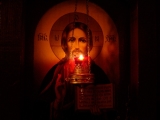 Глава УГКЦ у 158-й день війни: «Нехай Господь прийме з уст нашої Церкви псалми та моління за всіх тих, які особливо просять нашої молитви»
Глава УГКЦ у 158-й день війни: «Нехай Господь прийме з уст нашої Церкви псалми та моління за всіх тих, які особливо просять нашої молитви»
-
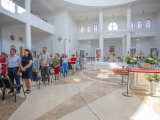 «Сила, яка походить із вірності Христові, є стержнем, який ніхто не може зламати», – Блаженніший Святослав
«Сила, яка походить із вірності Христові, є стержнем, який ніхто не може зламати», – Блаженніший Святослав
-
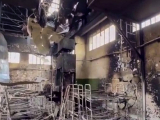 Глава УГКЦ у 157-й день війни: «В ім’я Боже ми засуджуємо звірства в Оленівці і світ повинен це засудити як особливий вияв дикості й жорстокості»
Глава УГКЦ у 157-й день війни: «В ім’я Боже ми засуджуємо звірства в Оленівці і світ повинен це засудити як особливий вияв дикості й жорстокості»
-
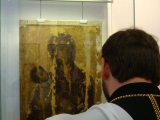 «Боже, почуй наш плач і поспіши нам на допомогу і порятунок!», – Глава УГКЦ у 156-й день війни
«Боже, почуй наш плач і поспіши нам на допомогу і порятунок!», – Глава УГКЦ у 156-й день війни
-
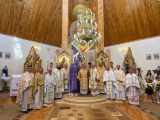 «Бог йому дав серце і душу українського народу»: відбулася щорічна проща до Прилбичів з нагоди уродин митрополита Андрея Шептицького
«Бог йому дав серце і душу українського народу»: відбулася щорічна проща до Прилбичів з нагоди уродин митрополита Андрея Шептицького
-
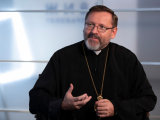 Глава УГКЦ: «Я горджуся українськими патріотами, які без найменшої краплі ненависті готові захищати своє»
Глава УГКЦ: «Я горджуся українськими патріотами, які без найменшої краплі ненависті готові захищати своє»
-
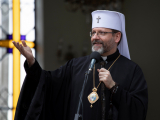 Блаженніший Святослав закликав українську молодь скласти присягу на вірність Христові
Блаженніший Святослав закликав українську молодь скласти присягу на вірність Христові
-
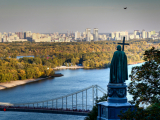 Глава УГКЦ у 155-й день війни: «Помолімося, щоб не втратити скарбу віри князя Володимира»
Глава УГКЦ у 155-й день війни: «Помолімося, щоб не втратити скарбу віри князя Володимира»
-
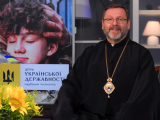 Блаженніший Святослав у День державності України: «Наша Держава – це для нас питання життя або смерті»
Блаженніший Святослав у День державності України: «Наша Держава – це для нас питання життя або смерті»
-
 Глава УГКЦ у 154-й день війни: «Нехай Господь Бог прийме у свої вічні обійми журналістів, які віддали за правду своє життя в Україні»
Глава УГКЦ у 154-й день війни: «Нехай Господь Бог прийме у свої вічні обійми журналістів, які віддали за правду своє життя в Україні»
-
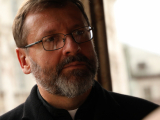 Глава УГКЦ у 153-й день війни: «Принесімо наш біль перед Боже обличчя і будьмо певні, що Він нас вислухає»
Глава УГКЦ у 153-й день війни: «Принесімо наш біль перед Боже обличчя і будьмо певні, що Він нас вислухає»
-
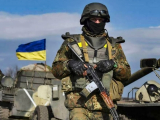 Глава УГКЦ у 152-й день війни: «Помолімся молитву заступництва за наших воїнів»
Глава УГКЦ у 152-й день війни: «Помолімся молитву заступництва за наших воїнів»
-
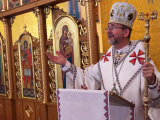 «Віруюча людина не може бути байдужою, коли бачить страждання іншої людини», – владика Богдан Дзюрах
«Віруюча людина не може бути байдужою, коли бачить страждання іншої людини», – владика Богдан Дзюрах
-
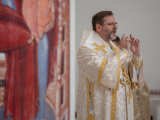 «Серед нашого страждання творімо простір для прояву Божої всемогутності», – Глава УГКЦ у 6-ту неділю після П’ятдесятниці
«Серед нашого страждання творімо простір для прояву Божої всемогутності», – Глава УГКЦ у 6-ту неділю після П’ятдесятниці
-
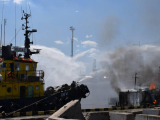 Глава УГКЦ у 151-й день війни: «Російське віроломство ми перемагаємо силою любові до нашої Батьківщини»
Глава УГКЦ у 151-й день війни: «Російське віроломство ми перемагаємо силою любові до нашої Батьківщини»

